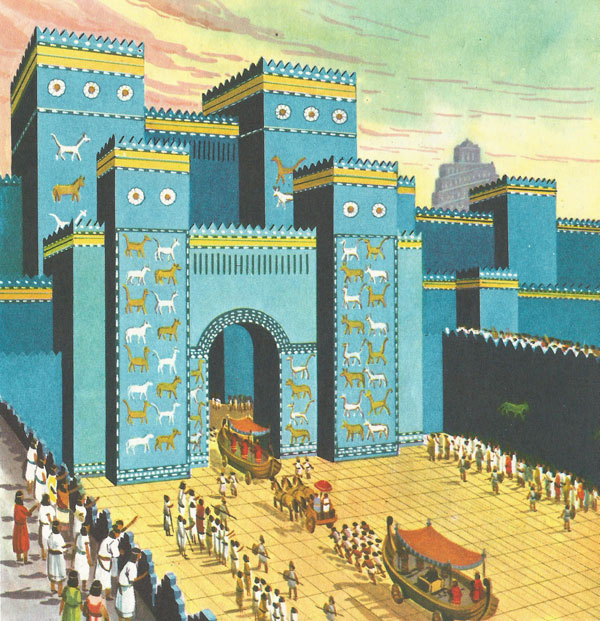
Stephen
Terry, Director

America
and Babylon
Commentary
for the June 9, 2018 Sabbath School Lesson
 “A
second angel followed and said, ‘Fallen! Fallen is Babylon the Great, which
made all the nations drink the maddening wine of her adulteries.’” Revelation 14:8,
NIV
“A
second angel followed and said, ‘Fallen! Fallen is Babylon the Great, which
made all the nations drink the maddening wine of her adulteries.’” Revelation 14:8,
NIV
As a child, I was privileged to have neighbors who were
willing to take me and my siblings to church with them each Sunday, even though
my parents had little interest in church or religion. This resulted in my being
exposed to an eclectic mix of beliefs that may have some bearing on my
willingness to consider various theological perspectives today. It also exposed
me at a very early age to some of the inconsistencies between dogma and
practice. For instance, I eventually ended up settling into the Nazarene Church
where some of my high school friends also attended. When I joined that church,
I was admonished that I was to avoid card playing and dancing. Soon thereafter
I was faced with a challenge over one of these requirements. I was a member of
the Boy Scouts who were sponsored by the local Mormon Church, and they put on a
dance with all scouts required to attend. Perhaps this was to make sure that
enough boys showed up to provide dance partners for all the girls who were
invited. In any event, I attended but did not dance with anyone because of my
nascent Nazarene faith. I was ridiculed by the other scouts over that and soon
thereafter I parted company with the local scout troop. This was in part
because the leaders made it clear that they preferred to spend time working on
merit badges with more co-operative scouts.
In spite of the pain of this experience, I decided I was
going to remain faithful to my commitment, and I sought to study the Bible more
intently so I could cite chapter and verse for my faith rather than simply
saying the church teaches this or that. I cast about for various Bible studies
and found several, but in every case, by the time I had completed a few
lessons, I could begin to see with my young, teenage mind that what the study
said the verses meant was inconsistent with what was actually written in the Bible.
At least that was the case until I came across the Voice of Prophecy Bible
Correspondence Course. I found this course attractive for two reasons. First,
no one would be breathing over my shoulder to make sure I got the meaning that
they felt should be read into the text, and second, I could go at my own speed.
Interestingly, while I expected the material to go slowly and to be secondary
to other things I needed to focus on for high school, I actually was so drawn
into the studies that I completed them, several at a time, and quickly finished
the few dozen lessons.
The Voice of Prophecy introduced me to what the Bible
had to say about Sabbath observance. Since I was an avid Sunday school student in
the Nazarene Church each week, I brought up some of the topics, including the
Sabbath, there. It was a frustrating experience for the teachers and me. The
concepts were new to them and they had no answers to guide me. I also brought
up some of the information at Wednesday night youth meetings. When I did so,
the youth leader’s visage changed and with a demonic expression, he accused me
of belonging to a cult and told me not to attend anymore. I honored his demand.
Perplexed, I spoke with the pastor and asked if he could help shed some light.
He promised to preach a sermon on the topic, but after a few months with
several such promises and no sermon forthcoming, I became convinced he was
hoping I would simply forget about it with time. Instead, I stopped attending
church, because I felt they did not have any answers that could help me grow further
spiritually.
At that time, I knew nothing about Seventh-day
Adventists (SDA) and was unsure what to do since I missed church fellowship.
Eventually, I discovered that a church only two blocks from my home met on
Saturdays for worship. I decided to check it out. I admit I was leery after my
experience with the Nazarenes, but I found kind, gentle people who were willing
to answer all my questions patiently and seemed more committed to their faith
and the Bible than I had experienced in any church before. As a result, I was
baptized, something the Nazarenes did not teach or require, and I have attended
the Seventh-day Adventist Church continuously for more than half a century now.
Have I found heaven on earth? No. Seventh-day Adventists have their flaws as
does everyone else. But a difference that I have noticed over time is that
there are many Seventh-day Adventists who are willing to examine those flaws
and dig deep into their Bibles to find answers. As a result, some of the former
fundamental positions of the church have changed over time. For example, when I
joined the church, it was the Vietnam War era and a position of Conscientious
Objection was strongly urged by the National Service Organization of the denomination.
This was a position that had its roots in the American Civil War when the
church sought such status for its members. But in recent decades, the church
has pulled back from that stance and instead now simply states it is up to each
member to decide for themselves. As a result, virtually all SDAs in the military
today are combatants. Conscientious objectors cannot enlist as such. It is a
classification only for draft purposes. With no draft currently, there is no
way for them to enter military service. This was made clear to me when the
draft ended after the Vietnam War, and I was forced out of the service as a
conscientious objector.
Among other beliefs that continue to be studied are
ordination and gender exclusiveness, Creation and how to understand it, and the
seventh-day, Saturday Sabbath and its significance for modern belief. The
latter being perhaps one of the most distinctive beliefs of the SDA church. To
be sure, there are other Christian denominations who observe the Sabbath as
well, such as the Seventh-day Church of God and the Seventh-day Baptists. But
the Adventists go beyond merely seeing the Sabbath as being biblical. It is seen
as a hallmark indicating a separation between those who would follow God, even
if it is inconvenient to do so, and those who would rather take the path of
least resistance and seek accommodation with what the rest of the world is doing.
A theme that exists throughout the Bible might be called
a “Tale of Two Cities.” On the one hand, we have Jerusalem, often referred to
as the city of God, and on the other hand, there is Babylon, founded in the ancient
past by Nimrod.[i]
Babel or Babylon was noted for a tower built to reach heaven. God had said he
would not flood the earth again,[ii] but the tower was built
because Nimrod and those who followed him preferred to place their trust in
their own ability rather than trust God’s word. This has been the conflict ever
since. Do we trust God and take him at his word, or do we instead plot our own
path guided by whatever intellectual lights we happen to possess? The Sabbath
is indicative of this conflict. It may even be said to be a mark of the entire
argument all summed up in a single twenty-four hour period. Do we accept that
gift of time God gave at Creation, or do we simply feel that one day is as good
as another and pick Sunday, since that is what everyone seems to be doing
anyway?
Some might ask, “How do we know that Saturday is even the seventh day after all
these many thousands of years? Maybe people lost track. That is a valid
assumption for apparently people did at one point lose track. That may be why
the Sabbath commandment says to remember.[iii] So if they lost track of
the Sabbath, how do we know we have the correct day? That was confirmed by God
for forty years while the Israelites wandered in the wilderness of the Exodus.
During that time, God provided the miracle of the Manna to feed those people,
and he provided it every day except Sabbath. Instead, he provided a double
portion on the sixth day to tide them over for the seventh.[iv] They never lost sight of
the Sabbath after that and many centuries later, Jesus was still keeping it.[v] It was not until the rise
of the Christian community and their desire to not be confused by the Romans with
the Jews, especially after two bloody Jewish revolts that Sunday observance
began to take place. But it never really replaced seventh-day Sabbath worship
until the fourth century when Constantine put the enforcement power of the
state behind the Sunday-keeping branch of Christianity, perhaps because Sunday
was already a holiday in pagan Rome, honoring the Sun. It was therefore easy to
gain popular support for the move politically.
Thus the struggle continues between what God has
established and what man prefers. The struggle between Jerusalem and Babylon
exemplified by the Sabbath continues to set that choice before every man and
woman. According to Jesus, most will choose the easy path of accommodation.[vi] We like to believe that
we will choose the right path when the time comes, but if it is hard now to choose,
what will it be like if we face serious persecution if we make that choice?.
Jesus said he does not expect to find much faith when he returns.[vii] On that day, will we be
found in Babylon or Jerusalem?
